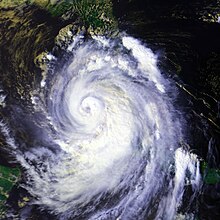 Hurricane Georges near the Florida Keys on September 25 | |
| Meteorological history | |
|---|---|
| Formed | September 24, 1998 |
| Dissipated | October 1, 1998 |
| Category 2 hurricane | |
| 1-minute sustained (SSHWS/NWS) | |
| Highest winds | 105 mph (165 km/h) |
| Lowest pressure | 964 mbar (hPa); 28.47 inHg |
| Overall effects | |
| Fatalities | 5 total |
| Damage | $340 million (1998 USD) |
| Areas affected | Florida Keys, South Florida, Florida Panhandle |
Part of the 1998 Atlantic hurricane season | |
| History
Effects
Other wikis | |
The effects of Hurricane Georges in Florida lasted for more than a week in late September and early October in 1998. After developing from a tropical wave to the south of Cape Verde on September 15, Georges moved steadily west-northwestward and peaked as a strong Category 4 hurricane on the Saffir–Simpson scale on September 20. After weakening slightly to a Category 3, the cyclone proceeded to strike Antigua, Saint Kitts and Nevis, Puerto Rico, Dominican Republic, and Cuba. Georges emerged into the Straits of Florida as a Category 1, but re-strengthened slightly to a Category 2 before making landfall in Key West, Florida, on September 25. The hurricane continued northwestward into the Gulf of Mexico and struck near Biloxi, Mississippi, on September 28. After moving inland, Georges turned eastward and crossing into the Florida Panhandle on the next day. By October 1, the system dissipated near the northeast Florida–southeast Georgia coast.
With a landfall predicted along the mainland of Florida, the National Hurricane Center (NHC) issued tropical cyclone warnings and watches, while more than 1.2 million people were ordered to evacuate. Strong winds left all of the Florida Keys without electricity. Georges damaged 1,536 houses and destroyed 173 homes throughout the island chain, many of which were mobile homes. The Florida Keys reported about $200 million in damage. While approaching landfall in Mississippi, Georges generated storm surge and abnormally high tides along the coast of the Florida Panhandle, causing erosion and coastal flooding near the west end of the state. After crossing into the panhandle, Georges dropped heavy rainfall, peaking at 38.46 in (977 mm) in Munson, flooding hundreds of homes in the region. The cyclone also spawned 17 tornadoes in the state, the most since Agnes in 1972. Georges caused five deaths and at least $340 million in damage in Florida.
After the storm, the name Georges was retired and removed from the Atlantic hurricane naming list. A disaster declaration allowed residents of the Florida Keys and 12 counties in the Florida Panhandle to receive aid through the Federal Emergency Management Agency.